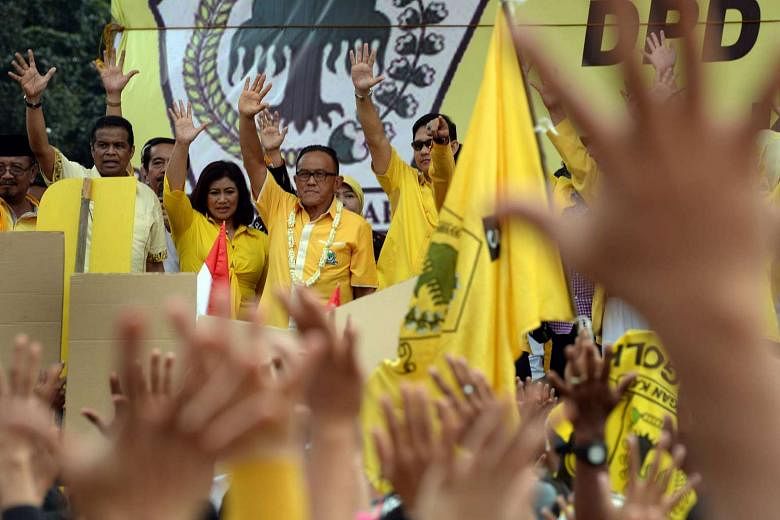In its editorial on Feb 23, the paper urges leaders of the Golkar party to be champions of clean politics.
Few would argue that practising politics requires huge investment, especially when running for public office or party chief post.
The ongoing race for the position of Golkar Party chief in Indonesia has brought about allegations of vote-buying and law enforcers have legitimate ground to step on as the practice may involve public officials.
Supporters of strong candidates for Golkar's top job have publicly accused each other of buying votes as the party congress to elect a new leader draws near.
Mr Nurdin Halid, a Golkar politician known to support the candidacy of Golkar faction head Mr Setya Novanto, claimed last week that a rival candidate promised S$10,000 to a regional party executive in North Sulawesi in exchange for an endorsement in the leadership race.
In an apparent counterattack, Golkar deputy treasurer Bambang Soesatyo, who supports House of Representatives Speaker Ade Komarudin's bid for Golkar's chief post, said he also heard the rival camps justify the dirty trick to win the race.
Neither Mr Nurdin nor Mr Bambang would follow up on their accusations with legal action as long as none of the alleged recipients of the bribes confessed, only to make the allegations hard to prove.
Golkar chairman Aburizal Bakrie has admitted to facing difficulties in providing evidence of the practice, although he promised to take tough measures against those who were proven of buying votes.
A senior Golkar politician believes each candidate will resort to money because such a practice has been in place for years.
"I heard those contesting the party chief post in Riau (in 2009) spent no less than Rp450 billion each. Now the amount can reach Rp 1 trillion," he said.
If the vote-buying is real, although unproven, the question is where the money comes from. There are Golkar politicians who used to run businesses, but they would think twice before sacrificing their personal or corporate assets for their political ambitions.
The only way to raise such a huge amount of money is to collect funds from sponsors, who will ask for repayment, or embezzling state money given their access to the state budget.
Our concern about possible theft of taxpayers' money for political interests is not without reason.
The Corruption Eradication Commission (KPK) has uncovered graft cases involving dozens of politicians since 2004, with some of them admitting to using the money to support their political ambitions.
The KPK should therefore scrutinise the upcoming Golkar congress on account of the reports of alleged vote-buying from within the party and possible misuse of state funds. But the KPK should not single out Golkar, as vote-buying is a problem facing all parties.
As the oldest political party in the country, Golkar can and should be a champion of clean politics, which is compulsory to help Indonesia win the fight against corruption.
Golkar chairman Aburizal's pledge to free the congress of vote-buying deserves support, but it should be translated into a clear rule of the game.
* The Jakarta Post is a member of The Straits Times media partner Asia News Network, an alliance of 22 newspapers.

